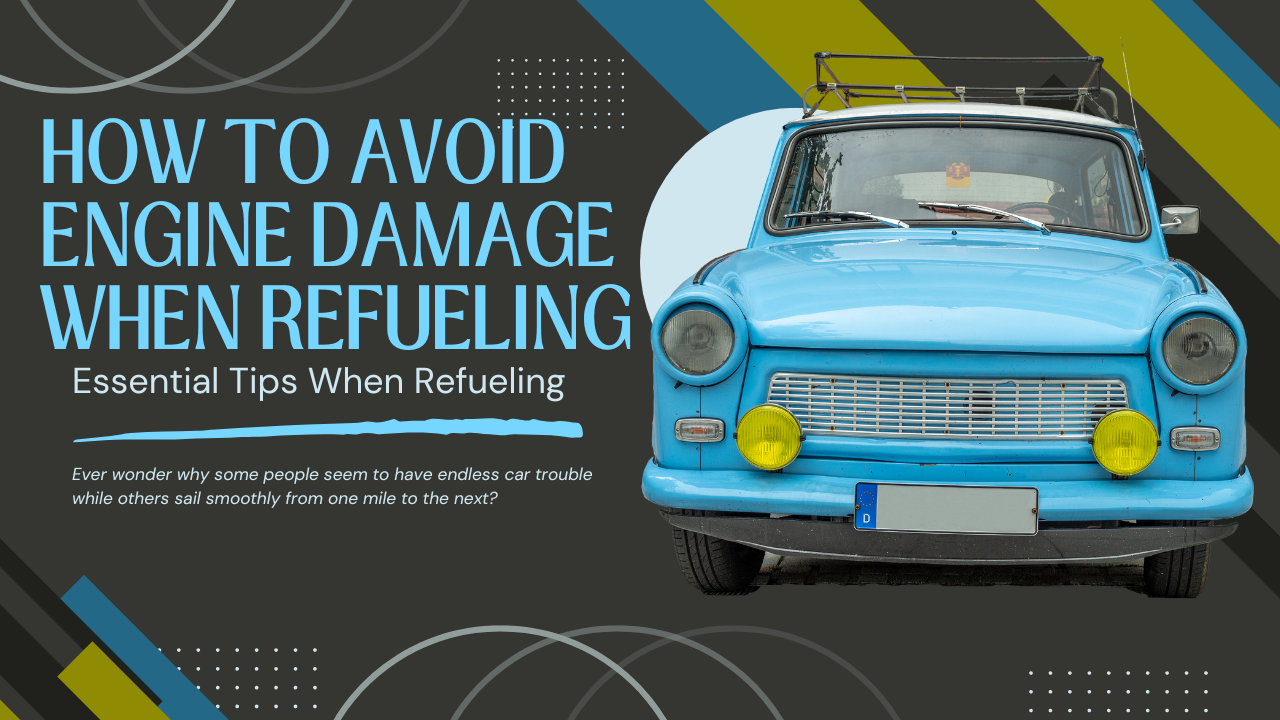
Ever wonder why some people seem to have endless car trouble while others sail smoothly from one mile to the next? Surprisingly, a lot of this boils down to small habits—like refueling. Yes, the simple act of filling up your tank can have a huge impact on your engine’s health. In this article, we’ll explore the common mistakes and essential tips to help you avoid engine damage when refueling. Whether you’re a new driver or a car enthusiast, following these guidelines can save you from costly repairs.
Why Proper Refueling Matters
Refueling might seem like a straightforward task, but doing it correctly can make a big difference in how your engine performs. Why is that? Think of your engine as the heart of your car, and fuel as the lifeblood. Just as impurities in the bloodstream can affect health, poor-quality fuel or mistakes during refueling can damage engine parts, leading to inefficiency and potential breakdowns.
Common Mistakes to Avoid
Many drivers unknowingly make mistakes when refueling that can compromise their engine’s lifespan. Let’s look at a few:
- Using the Wrong Fuel Type: Accidentally using diesel in a gasoline car (or vice versa) can cause serious damage.
- Overfilling the Tank: Many people top off their tanks, but overfilling can lead to leaks and potentially damage the fuel system.
- Ignoring Warning Signs: Gas caps not properly closed or odd smells should not be ignored.
Know Your Fuel Type
One of the simplest yet most important steps to prevent engine damage is to ensure you’re using the correct fuel type. The difference between gasoline and diesel engines means that using the wrong type can cause immediate and costly damage.
How to Avoid Using the Wrong Fuel
- Double-Check at the Pump: Always verify the fuel type displayed on the pump.
- Read the Fuel Label: Check your car’s fuel door, which usually has a label indicating the required fuel.
Check Fuel Quality
Not all fuel is created equal. Low-quality or contaminated fuel can clog fuel injectors, damage engine components, and lead to poor performance. Fuel quality checks can be tough at the pump, but knowing what to look for can help you avoid issues.
How to Ensure Good Quality Fuel
- Choose Reputable Stations: Larger, well-known stations often have stricter quality controls.
- Observe Fuel Station Cleanliness: Generally, cleaner stations maintain higher fuel standards.
Avoid Overfilling the Tank
Overfilling might seem harmless, but it can harm your car’s vapor recovery system, leading to potential leaks and increased emissions. Modern vehicles are designed to shut off automatically once the tank is full, and you should avoid adding more fuel after that point.
Risks of Overfilling
- Fuel Spillage: Overfilled tanks can lead to spillage, which is wasteful and harmful to the environment.
- Damaging the Charcoal Canister: This part captures fuel vapors and can be damaged when exposed to excess fuel.
Beware of Fuel Contamination
Fuel contamination can be caused by dirt, water, or other unwanted materials that make their way into your tank. Contaminants can clog your fuel filter or injectors, leading to engine inefficiency.
How to Prevent Fuel Contamination
- Avoid Refueling Right After a Fuel Delivery: Fuel being pumped into the station’s tanks can stir up sediment, potentially ending up in your car.
- Use Fuel Filters if Necessary: Some car models allow for additional filters to protect against contaminants.
Pay Attention to Warning Signs
Sometimes, your car will give you hints when something’s wrong after refueling. A persistent “check engine” light or odd noises should prompt you to investigate.
Tips for Cold Weather Refueling
Cold temperatures can make fuel more susceptible to thickening, particularly in diesel engines. Taking extra precautions when refueling in the winter can help prevent problems.
Cold Weather Tips
- Keep Your Tank Above Half Full: This prevents condensation from forming inside the tank.
- Use Winter-Grade Fuel: Especially important for diesel cars, as summer-grade fuel thickens in cold weather.
Refueling Safety Measures
Always prioritize safety at the pump. Avoid open flames or smoking, and turn off your car’s engine while refueling to prevent accidents.
Fuel Additives: Are They Necessary?
Fuel additives are products designed to enhance engine performance, reduce emissions, and clean the fuel system. However, they’re not always necessary for every vehicle.
When to Consider Additives
- For Older Cars: Fuel additives may help older cars maintain performance.
- If Recommended by Your Mechanic: Some additives may be beneficial if advised by a professional.
Diesel vs. Gasoline: Key Differences
Diesel engines and gasoline engines work differently and require specific fuels to function properly. Using the wrong fuel can lead to engine malfunctions and damage.
Diesel Fuel Characteristics
- High Compression Ignition: Diesel ignites differently than gasoline, using compressed air.
- More Energy-Dense: Diesel offers better mileage but can be harmful if used in a gasoline engine.
Maintenance Tips for Engine Health
Regular maintenance can prolong engine life. Beyond fuel considerations, ensure you follow your vehicle’s maintenance schedule for oil changes, air filter replacements, and fuel system inspections.
What to Do If You Accidentally Use the Wrong Fuel
Mistakes happen, and if you accidentally use the wrong fuel, here’s what to do:
- Don’t Start the Engine: Starting the car can cause fuel to enter the engine, worsening the problem.
- Contact Roadside Assistance: Many providers offer services to drain and flush the tank.
- Seek Professional Help: A mechanic can assess any potential damage.
Conclusion and Final Thoughts
Taking a few simple precautions during refueling can make a significant difference in the health of your engine. From using the right fuel type to avoiding overfilling and watching for warning signs, small actions add up to big savings. Keep these tips in mind next time you refuel, and your car will thank you with reliable performance for years to come.
FAQs
1. Can overfilling the fuel tank damage my car?
Yes, overfilling can damage your car’s vapor recovery system and lead to fuel spillage.
2. What should I do if I accidentally put the wrong fuel in my car?
Avoid starting the engine and contact roadside assistance or a mechanic immediately.
3. Why is it important to check the fuel quality?
Low-quality fuel can clog fuel injectors and damage engine components, reducing performance.
4. Are fuel additives necessary?
Not always; however, they can benefit older cars or specific engine conditions as recommended by a mechanic.
5. What’s the difference between gasoline and diesel fuel?
Diesel is denser and ignites differently from gasoline, making it incompatible with gasoline engines and vice versa.






